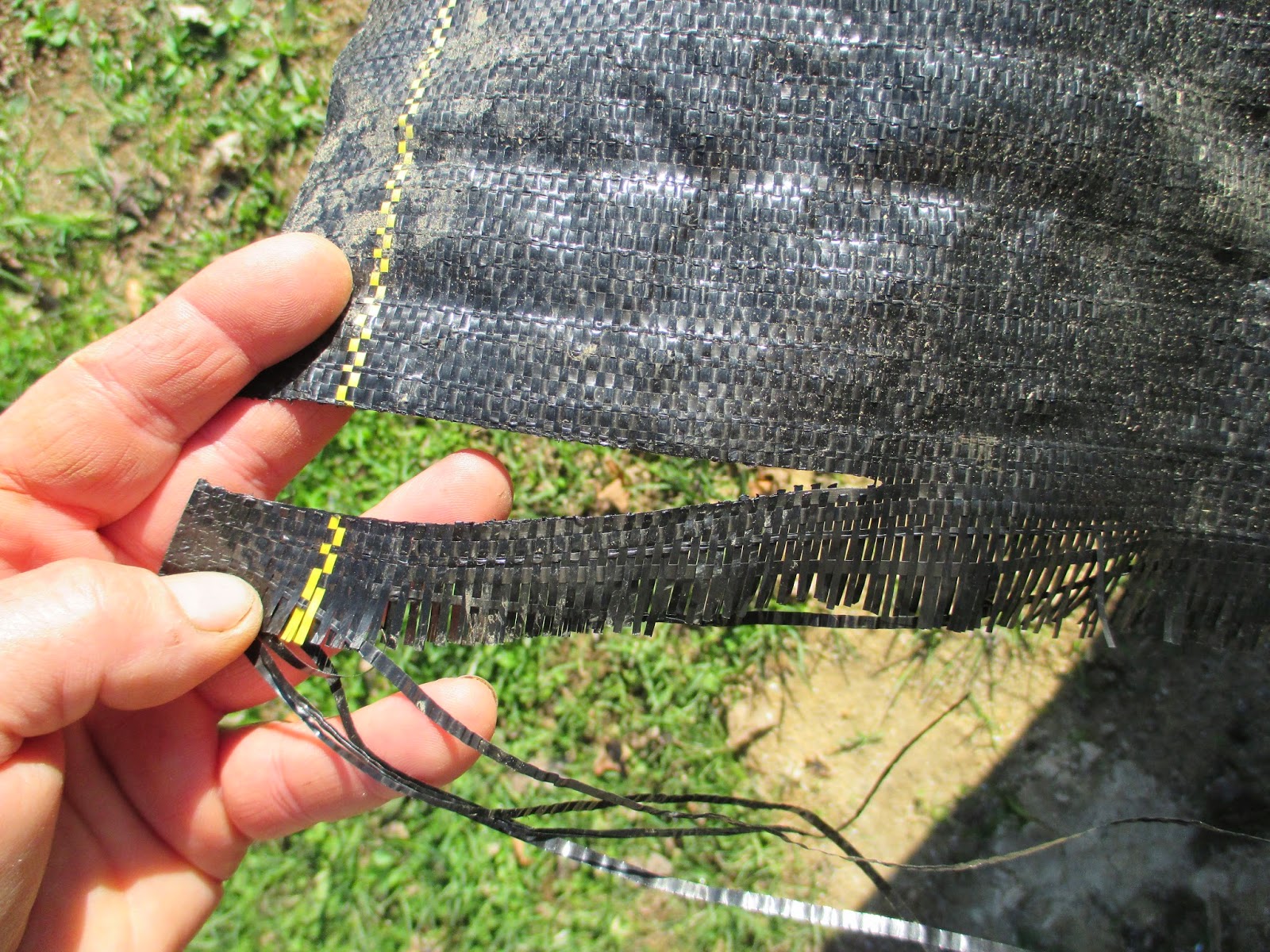Dateline: 17 May 2014
 |
| One of my garden beds with an occultation cover. Click the picture to see an enlarged view. |
Fortier uses the plastic in two ways. First, he uses it to cover his 30" wide beds that are prepared-for-planting….
[W]eeds germinate in the warm, moist conditions created by the tarp but are then killed by the absence of light. This weeding technique, described as "occulation," is widely used by organic growers in Europe.
I've never heard of the word, "occultation" and a Google search of the word "occultation" and "garden" didn't turn up anything. Although the concept is nothing new to most gardeners, I think the word is. Here is what else Jean-Martin Fortier writes…
We have been using 6mm black plastic silage tarps in the garden for almost a decade now, and I can say without hesitation that their usefulness is one of the reasons behind the overall success of our operation. This passive and efficient practice takes care of part of the weeding chores while we are getting work done elsewhere in the garden.
I don't have a 1.5 acre market garden, and don't have a black silage tarp, but I decided to use some 48" wide lengths of This High-Quality Landscape Fabric for occultation covers in my garden, as the picture at the top of the page shows.
The tire sidewalls, which I have been collecting and using in various ways in my garden for years, do a fine job of holding the plastic in place. After being covered a few weeks, the soil under the covers is weed-free and moist. The tilth of the soil under the covers is dreamy-nice.
After using the plastic for occultation covers, I folded it in half and laid it between the beds, as shown in this next picture…
When a bed is harvested and not growing anything, I will re-cover it with an occultation cover to keep the weeds from developing. That is what Jean-Martin does.
Thus far, I'm liking this landscape fabric. I did, however, find out that it will unravel on the ends if not heat-sealed, as this next picture shows…
I'm impressed with the durability of the landscape fabric. It remains to be seen if it will last 10 years, as the manufacturer says it will. But the following YouTube clip is evidence of just how strong and long-lasting the product is…


























































































































21 comments:
I use that fabric in my nursery. It's impressive stuff.
So no more cover cropping?
Clinton,
A cover crop could be planted and then cut and covered for a few weeks prior to planting. Do you think that would work?
Sounds logical to me! Would you then be running your tiller over it or go with the lasagna style gardening?
I think that the word occulation was just spelled wrong, and the word they were going for was occultation. Not the best choice of words, but I do get the point.
I'm a die hard Ruth Stout and Back to Eden person myself, however not many have the outstanding compost, hay, leaves and straw resources I do either.
I'm looking very forward to seeing how this does in your garden, and I can tell you that MANY have had Fantastic results from this kind of covering in their gardens, and better than anything else they have used too. Hope you get the same results they have.
Thank you for your enduring enthusiasm and for your generous sharing!
I also tried a Google search and the word "occultation" turned up... I guess you just misspelled the word. Market Gardener used the word occultation...
Oops, now I see that others may have informed you also...
Thanks for setting me straight on the spelling mistake. Occultation not occulation. But my attempts to edit the word have not been successful. I'll try again....
Its a french word. I think it just means covering, barrier or something similar.
http://www.gardenprice.com/clotures-et-occultants-naturels-et-plastiques.aspx
I totally understand using a resource you already have. However, if anyone is thinking about row covers new, there are non-woven products, as well as biodegradable ones on the market. If you want, you can skip both the fraying and the possible plastic pollution in your garden.
At our current size, we're just using free for the hauling used burlap coffee sacks. It's heavy enough when wet (and we get constant rain in the winter) that there is no staking needed.
I also thought you might find Richard Perkin's video on this interesting.
https://www.youtube.com/watch?v=WT6hqdLb7mk
Thanks for sharing Herrick!
nice
Great Article! Thanks for sharing this type of article is very helpful for us!
white tarpaulin sheet
Its Old But Very Helpful and Enjoyful I Love it.
tarpaulin
Outclass blog
tarpaulin
This post is a goldmine of data! I particularly enjoyed your point about Heavy Duty tarpaulin.
A Weed control mat manufacturers in India, also known as weed barrier fabric or landscape fabric, is a material used in gardening and landscaping to prevent the growth of weeds while allowing air, water, and nutrients to pass through to the soil. Weed mats are commonly used in flower beds, vegetable gardens, pathways, and under mulch to help reduce the need for herbicides or constant manual weeding.
Loved this blog on tarpaulins! Super clear and easy to understand—really helped me see how useful they can be.
Tarpaulins Cover
nice
Excellent very good and very informative post I really like it thank you so much
Tarpaulins UK
Finding trusted Woven Weed Barrier Manufacturers can change the way your garden or farm functions. Quality woven fabrics allow water to pass through while stopping weeds from thriving, creating the perfect environment for plant growth. These manufacturers typically use HDPE materials that offer strength and durability. Be sure to check for UV stabilization and eco-friendliness. Always rely on experienced and innovative manufacturers for performance and peace of mind.
Cool
Post a Comment